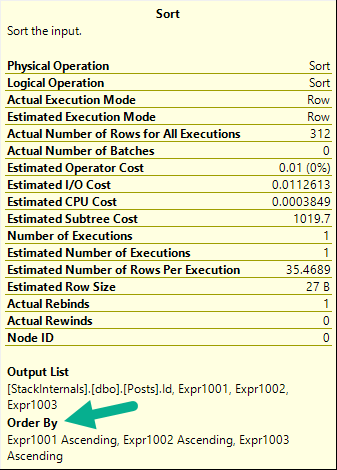Local Disasters
I see this kind of pattern a lot in paging queries where people are doing everything in their power to avoid writing dynamic SQL for some reason.
It’s almost as if an entire internet worth of SQL Server knowledge and advice doesn’t exist when they’re writing these queries.
Quite something. Quite something indeed.
First, let’s get what doesn’t work out of the way.
DECLARE @order_by INT = 3
SELECT p.Id
FROM dbo.Posts AS p
WHERE p.OwnerUserId = 22656
ORDER BY CASE WHEN @order_by = 1 THEN p.Score
WHEN @order_by = 2 THEN p.CreationDate
WHEN @order_by = 3 THEN p.Id
ELSE NULL
END;
GO
You can’t write this as a single case expression with mismatched data types.
It’ll work for the first two options, but not the third. We’ll get this error, even with a recompile hint:
Msg 8115, Level 16, State 2, Line 46 Arithmetic overflow error converting expression to data type datetime.
What Works But Still Stinks
Is when you break the options out into separate case expressions, like so:
DECLARE @order_by INT = 1
SELECT p.Id
FROM dbo.Posts AS p
WHERE p.OwnerUserId = 22656
ORDER BY CASE WHEN @order_by = 1 THEN p.Score ELSE NULL END,
CASE WHEN @order_by = 2 THEN p.CreationDate ELSE NULL END,
CASE WHEN @order_by = 3 THEN p.Id ELSE NULL END;
GO
This will work no matter which option we choose, but something rather disappointing happens when we choose option three.
Here’s the query plan. Before you read below, take a second to try to guess what it is.

What Stinks Even Though It Works
My issue with this plan is that we end up with a sort operator, even though we’re ordering by Id, which is the primary key and clustered index key, and we use that very same index. We technically have the data in order, but the index scan has False for the Ordered attribute, and the Sort operator shows a series of expressions.

The Sort of course goes away if we add a recompile hint, and the Scan now has True for the Ordered attribute.
DECLARE @order_by INT = 3
SELECT p.Id
FROM dbo.Posts AS p
WHERE p.OwnerUserId = 22656
ORDER BY CASE WHEN @order_by = 1 THEN p.Score ELSE NULL END,
CASE WHEN @order_by = 2 THEN p.CreationDate ELSE NULL END,
CASE WHEN @order_by = 3 THEN p.Id ELSE NULL END
OPTION(RECOMPILE);
GO

You Shouldn’t Do This
Unless you’re fine with recompile hints, which I don’t blame you if you are.
SQL Server seems to get a whole lot more right when you use one, anyway.
My point though, is that adding uncertainty like this to your queries is more often than not harmful in the long term. Though this post is about local variables, the same thing would happen with parameters, for example:
DECLARE @order_by INT = 3
DECLARE @sql NVARCHAR(MAX) = N'
SELECT p.Id
FROM dbo.Posts AS p
WHERE p.OwnerUserId = 22656
ORDER BY CASE WHEN @order_by = 1 THEN p.Score ELSE NULL END,
CASE WHEN @order_by = 2 THEN p.CreationDate ELSE NULL END,
CASE WHEN @order_by = 3 THEN p.Id ELSE NULL END;
';
EXEC sys.sp_executesql @sql, N'@order_by INT', 1;
EXEC sys.sp_executesql @sql, N'@order_by INT', 3;
GO
The way to address it would be something like this:
DECLARE @order_by INT = 3
DECLARE @sql NVARCHAR(MAX) = N'
SELECT p.Id
FROM dbo.Posts AS p
WHERE p.OwnerUserId = 22656
ORDER BY ';
SET @sql +=
CASE WHEN @order_by = 1 THEN N'p.Score'
WHEN @order_by = 2 THEN N'p.CreationDate'
WHEN @order_by = 3 THEN N'p.Id'
ELSE N''
END;
EXEC sys.sp_executesql @sql
GO
Thanks for reading!
Going Further
If this is the kind of SQL Server stuff you love learning about, you’ll love my training. I’m offering a 75% discount to my blog readers if you click from here. I’m also available for consulting if you just don’t have time for that and need to solve performance problems quickly.
Awesome! I Liked this post Erik Darling!!